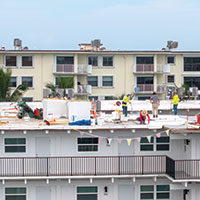 Condos join alliance to fight state rules on reserves
Condos join alliance to fight state rules on reserves
STORY BY PIETER VANBENNEKOM (Week of September 19, 2024)
Several 32963 condo Home Owner Associations (HOAs) have joined a new a regional alliance to continue the fight to ease the crushing costs imposed on them by a state law passed in wake of the 2021 high-rise building collapse in Surfside that left 98 people dead.
The newly minted Treasure Coast Condominium Alliance (TCCA) already includes 14 HOAs from all along the Treasure Coast, starting with Robles del Mar in Indian River Shores, including the Racquet Club and The Gables in Vero Beach, as well as other buildings on Hutchinson Island and down to Stuart.
The alliance is trying to mitigate the financial impact of new Florida laws that mandate a Structural Integrity Reserve Study (SIRS) for all buildings three stories or higher within three miles of a shoreline, to be completed by the end of this year, and force HOAs to fully fund reserve funds for all substantial repair and maintenance projects that those studies find necessary.
The new requirements are expected to necessitate special assessments as high as $50,000 per condo unit in some buildings.
The president of the Harborage Condo Association in Stuart, Darlene Vanripper, since April has taken the lead in contacting other HOAs through the property management company, Elliott Merrill, and has formally incorporated the alliance as an LLC.
The presidents of 14 HOAs are now meeting monthly via Zoom to compare notes, share ideas and plot strategy. Other area HOAs are expected to join as well.
The special assessments to fund reserve funds that have condo HOAs worried are coming on top of whopping increases of sometimes more than 100 percent in insurance rates because of the unrelated insurance crisis which has seen many large insurance companies flee the state. Soaring insurance premiums have often resulted in doubling of monthly maintenance costs.
“They are pricing us out of our homes,” said Mark Shea, the energetic new president of the Robles del Mar HOA, who took over early this year. He noted that many seniors living on fixed incomes will not be able to afford the extra costs. Even for those who manage to hold on to their homes, he said, their property values will be seriously affected since anyone contemplating buying a condo will take a looming $50,000 assessment right off the top of the purchase price.
So far, the alliance hasn’t gotten anywhere with state officials. A meeting in Stuart with state Sen. Jason Pizzo of Miami, the author of the legislation, and two other area legislators proved fruitless. Pizzo listened to the HOAs’ concerns, but all suggestions he made for trying to get relief turned out to be dead ends.
“He seemed to have no idea what we were talking about,” Shea said. “The county building departments are supposed to manage the program, but they have not hired staff and they have no idea, either.”
The problem, Shea explained, is that any licensed engineer or architect carrying out the structural study can arbitrarily order up a new roof, a new basement, or whatever else, regardless of financial consequences. “It seems like a huge money grab,” Shea said. “We feel like we’re being held hostage here. And Mr. Pizzo said he was surprised to hear that – it was not what he had intended with the law.”
However, despite an initial rebuff, the alliance has not given up. The regional HOAs have now hired an experienced lobbyist, Travis Moore, who has set up meetings with top state officials in Tallahassee for later this month.
At a meeting in South Florida last week, Gov. Ron DeSantis said he would be amenable to a special session of the Florida legislature this fall to address the problem, but the legislature has not yet moved to do so. Some leading legislators said they thought the matter can wait until next year.
Shea, for one, disagrees, and says condo owners urgently need help now. He views the new law as a well-intended measure to prevent future tragedies, but that it has resulted in a “huge over-reach.” Most Florida buildings are in fine shape and nowhere near as disaster-prone as the Champlain Towers in Surfside, where HOA boards had for years “kicked the can down the road” for urgently needed repairs.
Specifically, the alliance is asking for three amendments to the SIRS law to make the law’s unintended consequences more manageable. First, they are asking for some procedure by which the conclusion of a structural inspection can be challenged so HOAs are not held hostage to any arbitrary demands for possibly unnecessary repairs.
Secondly, they are asking to soften the requirement that all structural reserves be fully funded immediately for any repairs likely to come up over the next 30 years. “That’s just not reasonable,” Shea said. “No one does that for one’s own private home or business. We’re asking if that can be spread out over more time, possibly 10 or 15 years.”
Lastly, Shea said, if all else fails, the alliance is asking if the state can at least provide interest-free loans to HOAs to finance the funding of the reserves.
“We are asking for anything that can be done to remove some of the financial burdens on us,” Shea said. “We desperately need some of this dialed back.” Shea believes that at this point, only political pressure will get any result, and “we intend to make enough noise and remind the legislators that our condos have a lot of voters in them.”
Shea and the other presidents of the TCCA members have sent individual message to their unit owners requesting that they contact their state legislators to ask for relief. He urged his own residents in Indian River Shores to contact State Sen. Erin Grall and State Rep. Robbie Brackett, both Republicans like the Governor and the majority of state legislators.
“The SIRS legislation has been more detrimental to all of us than any (other) single issue, and could be for many years,” Shea said in his email to the residents of his 72-condo complex.



